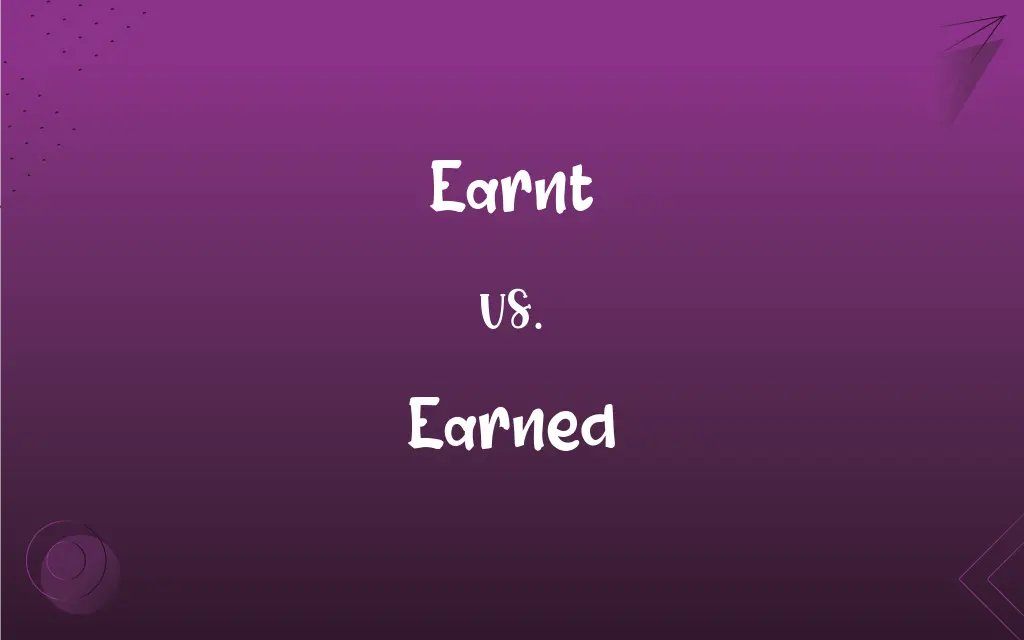Earnt vs. Earned: What's the Difference?
By Aimie Carlson & Janet White || Updated on March 4, 2024
"Earnt" is a less common, primarily British variant spelling of "earned," which represents the past tense of "earn," indicating receiving something in return for labor or service.

Key Differences
"Earned" is the standard past tense and past participle form of "earn," used universally in American and most British English contexts. It signifies receiving payment or reward for work or service. Whereas "earnt" is considered an informal or less commonly used variant, primarily found in British English, it carries the same meaning but is less accepted in formal writing.
"Earned" is widely recognized and used in formal and academic writing, signifying its acceptance in professional and educational contexts. On the other hand, "earnt," while understandable, might be viewed as colloquial or nonstandard, especially in American English or in contexts emphasizing standardized language use.
In terms of usage, "earned" appears in various English language exams and standardized tests, highlighting its universal acceptability. Whereas "earnt" is seldom seen in such contexts, reflecting its limited use and acceptance outside of certain British English dialects.
Educational materials, including textbooks and language courses, predominantly use "earned" to teach the past tense of "earn." On the other hand, "earnt" may be introduced as a variant in some British English-focused materials, but with caution about its limited acceptance.
Online language resources and dictionaries often list "earned" as the primary form, with "earnt" mentioned as an alternative if at all. This distinction underscores "earned's" broader acceptance and "earnt's" regional or informal status.
ADVERTISEMENT
Comparison Chart
Standard Usage
Universal in American and British English
Primarily in British English
Formality
Accepted in formal and academic writing
Considered informal or nonstandard
Acceptance in Exams
Widely accepted
Rarely accepted
Educational Materials
Predominantly used
Limited use, with caution
Dictionary Listings
Listed as the primary form
Often listed as an alternative
ADVERTISEMENT
Earnt and Earned Definitions
Earnt
Received as interest or dividends.
The investment earned him a good return.
Earned
Acquired money for work.
He earnt a decent wage working there.
Earnt
Achieved something by effort.
They earned a reputation for reliability.
Earned
Gained deservedly for effort.
She earnt praise for her volunteer work.
Earnt
Acquired money in return for labor or services.
She earned a significant bonus for her exceptional work.
Earned
Received as a return on investment.
The shares earnt him a steady income.
Earnt
Gained or deserved as a result of effort or action.
He earned respect from his peers through his dedication.
Earned
Achieved through hard work.
They earnt their place in the finals.
Earnt
Accrued or accumulated over time.
The account has earned interest over the years.
Earned
Accumulated as a benefit or advantage.
Over time, their efforts earnt significant goodwill.
Earnt
(chiefly British) earn
Earned
Simple past tense and past participle of earn
Earned
Gained as a result of effort or action; - used especially of income; as, earned income. Contrasted with unearned.
Earned
Not resulting from an error by an opposing team; - used in the phrase earned runs.
Earned
Gained or acquired; especially through merit or as a result of effort or action;
A well-earned reputation for honesty
Earned income
An earned run in baseball
FAQs
Can I use "earnt" in an English exam?
It's safer to use "earned," as it is widely accepted in standardized tests and exams.
Is "earnt" acceptable in formal writing?
"Earnt" is generally not recommended for formal writing, especially in American English contexts.
Why do some people use "earnt"?
"Earnt" is used in some British English dialects, reflecting regional language variations.
What is the difference between "earnt" and "earned"?
"Earned" is the universally accepted past tense of "earn," while "earnt" is a less formal, chiefly British variant.
Which form should I use in a job application?
Use "earned" to ensure formality and universal acceptance.
Is "earnt" recognized in American English?
"Earnt" is much less common in American English and may be considered incorrect.
Are there regional variations in the acceptance of "earnt"?
Yes, "earnt" may be more accepted in certain British regions compared to others.
Are "earnt" and "earned" interchangeable?
While they can be interchangeable in meaning, "earned" is preferred for broad acceptance.
How do dictionaries treat "earnt"?
Many dictionaries list "earnt" as an alternative or variant form, with "earned" as the primary entry.
Do language courses teach "earnt"?
Most language courses focus on "earned," though some may mention "earnt" in British English contexts.
How should non-native speakers approach using "earnt" and "earned"?
Non-native speakers are advised to use "earned" to ensure clear communication and acceptance across English-speaking contexts.
Is "earnt" a new form?
"Earnt" is not new; it has been used historically but is less common today.
How do online language forums view "earnt"?
Opinions may vary, but many online language forums recommend using "earned" for clarity and broad acceptance.
What impact does using "earnt" have on international communication?
It could lead to misunderstandings or perceptions of informal or nonstandard English usage in international contexts.
Are there any professional contexts where "earnt" is preferred?
"Earnt" is generally not preferred in professional contexts, with "earned" being the standard choice.
Can using "earnt" impact the perception of my English skills?
Yes, using "earnt" in contexts that favor standardized English may negatively affect perceptions of your language proficiency.
Does using "earnt" in speech differ from writing?
"Earnt" may be more accepted in informal speech, especially in British English, than in writing.
How does the usage of "earnt" vs. "earned" affect comprehension?
Both are comprehended by English speakers, but "earned" is more universally understood.
What guides the choice between "earnt" and "earned"?
The choice can depend on regional preference, formality, and the context in which you are writing or speaking.
Why is "earned" preferred in educational settings?
"Earned" is preferred for its universality and clear acceptance across various English dialects.
About Author
Written by
Aimie CarlsonAimie Carlson, holding a master's degree in English literature, is a fervent English language enthusiast. She lends her writing talents to Difference Wiki, a prominent website that specializes in comparisons, offering readers insightful analyses that both captivate and inform.
Co-written by
Janet WhiteJanet White has been an esteemed writer and blogger for Difference Wiki. Holding a Master's degree in Science and Medical Journalism from the prestigious Boston University, she has consistently demonstrated her expertise and passion for her field. When she's not immersed in her work, Janet relishes her time exercising, delving into a good book, and cherishing moments with friends and family.
































































